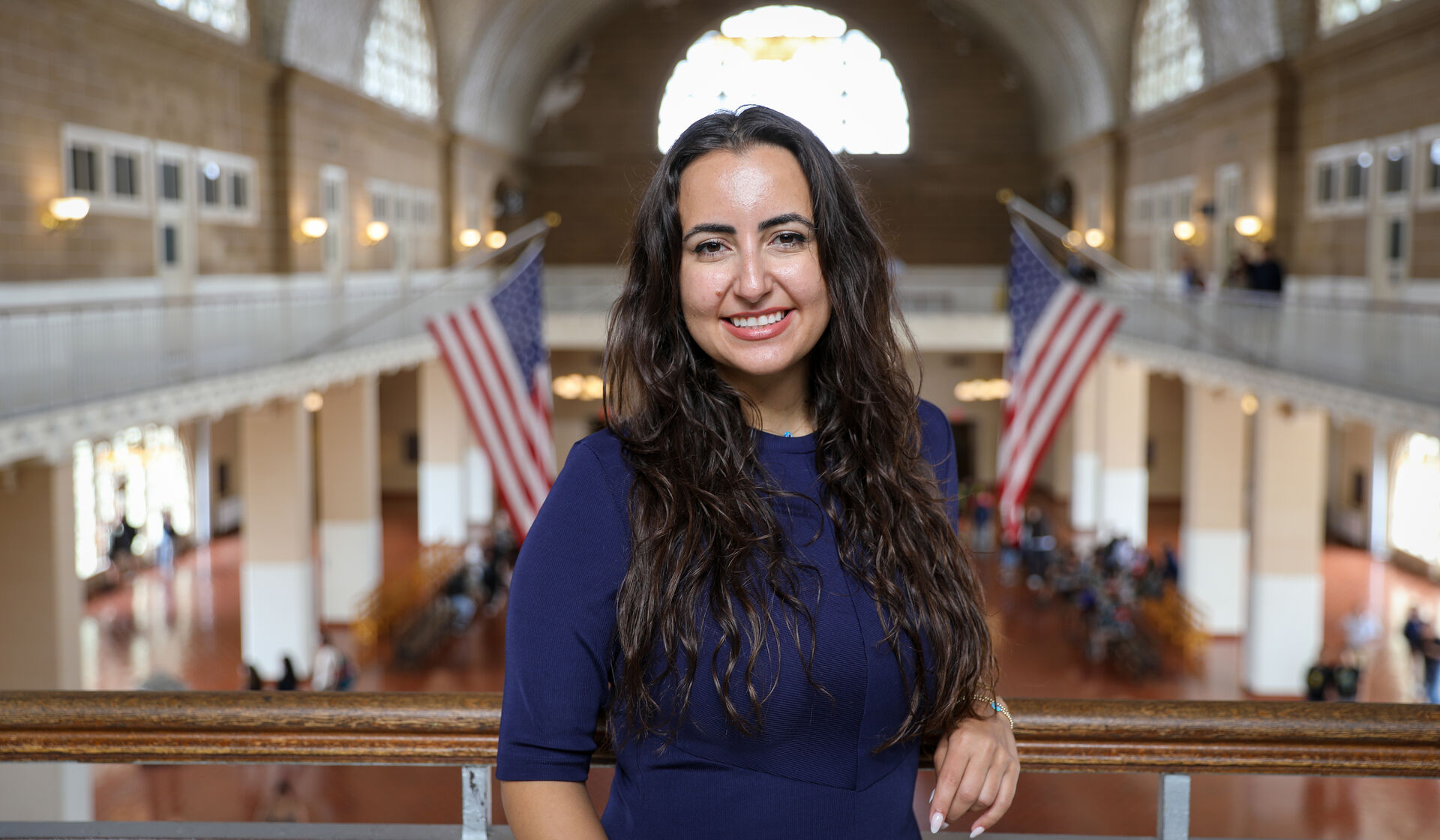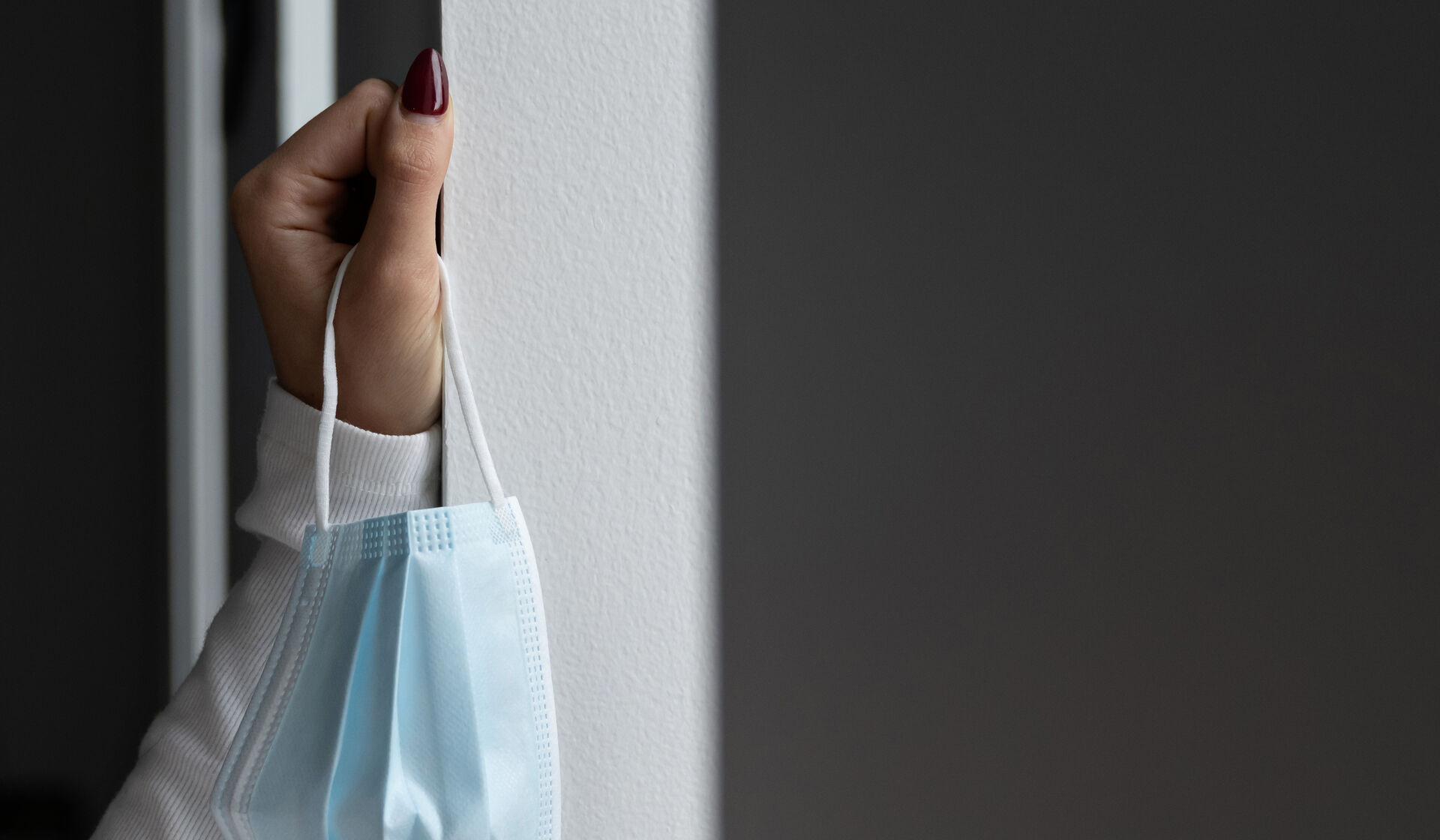A Sporting Chance
•
PHOTOS BY LEISA THOMPSON
Sports has always been a keen passion of Oluwaferanmi Okanlami, MD’11. Born in Nigeria, he grew up in South Bend, Indiana, and attended high school in Massachusetts, where he played several sports before moving on to Stanford University. During his undergraduate years there, he was the captain of the track and field team for two years and earned NCAA Academic All-American recognition in the triple jump.
But an accident at a July Fourth gathering in 2013 turned the world upside down for Okanlami, who was starting his third year of orthopedic surgery residency at Yale. He broke his neck in a diving accident and was paralyzed from his chest down with very minimal use of his upper extremities.
Then 28, he underwent two surgeries performed by his Yale colleagues, followed by months of intensive rehabilitation in Chicago. He returned to South Bend to live with his family and continue outpatient therapy.
“When people talk about how the accident changed my life or how it remade me, I tell them, ‘Who knows what my trajectory was supposed to be?’” says Okanlami, U-M assistant professor of family medicine, physical medicine and rehabilitation, and urology. “The accident seemingly changed the course of steps I was taking then and there. But I try to look at everything in a positive light to say there’s a reason for all things that happen.”
During his recovery, Okanlami gained not only some motor function and the ability to move his legs; he also gained a new perspective on disability “from the other side of the stethoscope.”
“Years later, I recognized that an ‘ableist framework’ made me feel that walking was the be- all and end-all of recovery,” Okanlami says. “I’ve met many people in the disability community since then who have opened my eyes and my mind to what disability actually is and how we define our worth.”
Okanlami learned firsthand the importance of removing barriers and making reasonable accommodations for people with disabilities as he pursued his master’s degree in engineering, science, and technology entrepreneurship at Notre Dame and completed his family medicine residency at Memorial Hospital of South Bend in 2017. Pete Buttigieg, then mayor of the city, appointed Okanlami to the St. Joseph County Board of Health, where he served as a voice for the disability community.
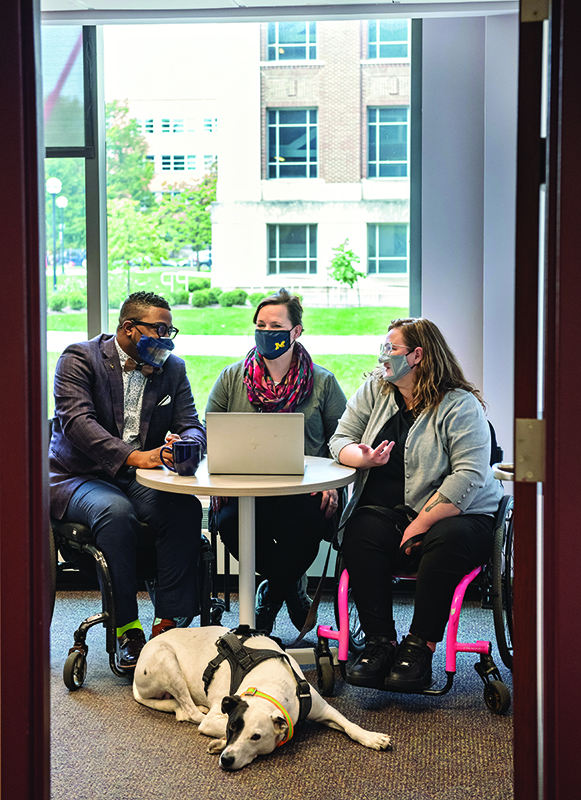
“As I became involved in public health work, I began to think about the needs of the people in our community and to identify as an individual with a disability,” Okanlami says. “I began understanding disability as an identity in a culture and not as a pathology.”
Okanlami later trademarked his catch phrase, “Disabusing Disability,” to convey the idea that disability doesn’t mean inability and became an advocate for a more accessible, inclusive health system. He also has collaborated with rehab engineers and medical-device companies on innovations to help individuals with disabilities.
His work in South Bend also rekindled his passion for sports when he was introduced to the River City Challenged Athletes, a nonprofit that supports local adaptive-sports teams.
“I started playing adaptive sports, something I knew nothing about during my former athletic career and my medical training,” Okanlami says. He coached the wheelchair basketball team and participated in sled hockey. Today, he still serves on the nonprofit’s board and continues to play, coach, and promote adaptive sports.
“I have the same passion to increase awareness of and access to adaptive sports,” says Okanlami.
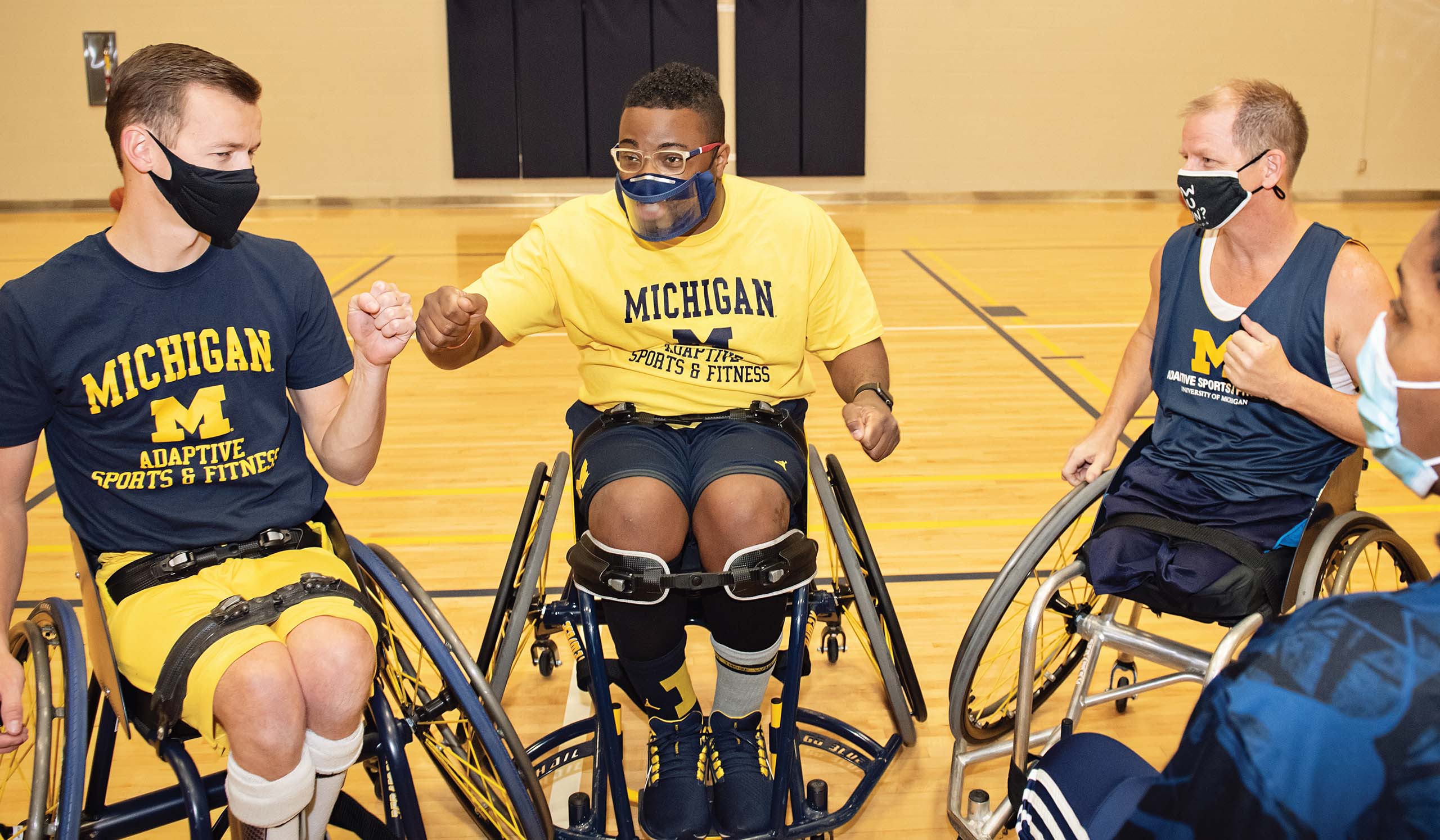
In 2018 Okanlami decided to return to U-M, where he could apply his multifaceted experiences as an orthopedic surgery resident, athlete, primary care physician, and individual who identifies with the disabled and BIPOC (Black, indigenous, and people of color) communities.
At the University, he was named assistant professor of family medicine with a dual appointment in the Department of Physical Medicine and Rehabilitation. He also became director of medical student programs in the Office for Health Equity and Inclusion.
It was a welcome homecoming that brought him full circle to his medical alma mater.
One decade earlier, in 2007, Okanlami had enrolled in the U-M Medical School, following in the footsteps of Milton Little, MD’08. Little also had run track as a student at Stanford and coached its track team during Okanlami’s first year at Stanford before pursuing his medical studies at Michigan.
“I fell in love with the University of Michigan and all it has to offer, so I came to medical school here,” Okanlami recalls. “I had finished my NCAA career at Stanford, but I played intramural sports throughout medical school. The track and field coach even allowed me to triple jump one last time in an unattached track meet.”
Today, he directs the University’s Student Accessibility and Accommodation Services (SAAS), which oversees Adaptive Sports and Fitness (ASAF). The ASAF program invites people in the U-M and Ann Arbor communities to participate in adaptive sports, including track and field, wheelchair tennis and basketball, and horsemanship. Okanlami recently placed in the C division at the 2021 USTA Collegiate Wheelchair Tennis National Championships and hopes to contribute to newly formed wheelchair basketball.
The ASAF program also has supported multiple U-M students as they train for collegiate and international competitions. Last summer two ASAF athletes, Sam Grewe and Leo Merle, competed at the Paralympic track and field trials in Minneapolis in hopes of being selected to represent the United States at the Tokyo Paralympics. Merle, a student in the School of Dentistry, suffered a leg injury that postponed his Paralympic chances until 2024.
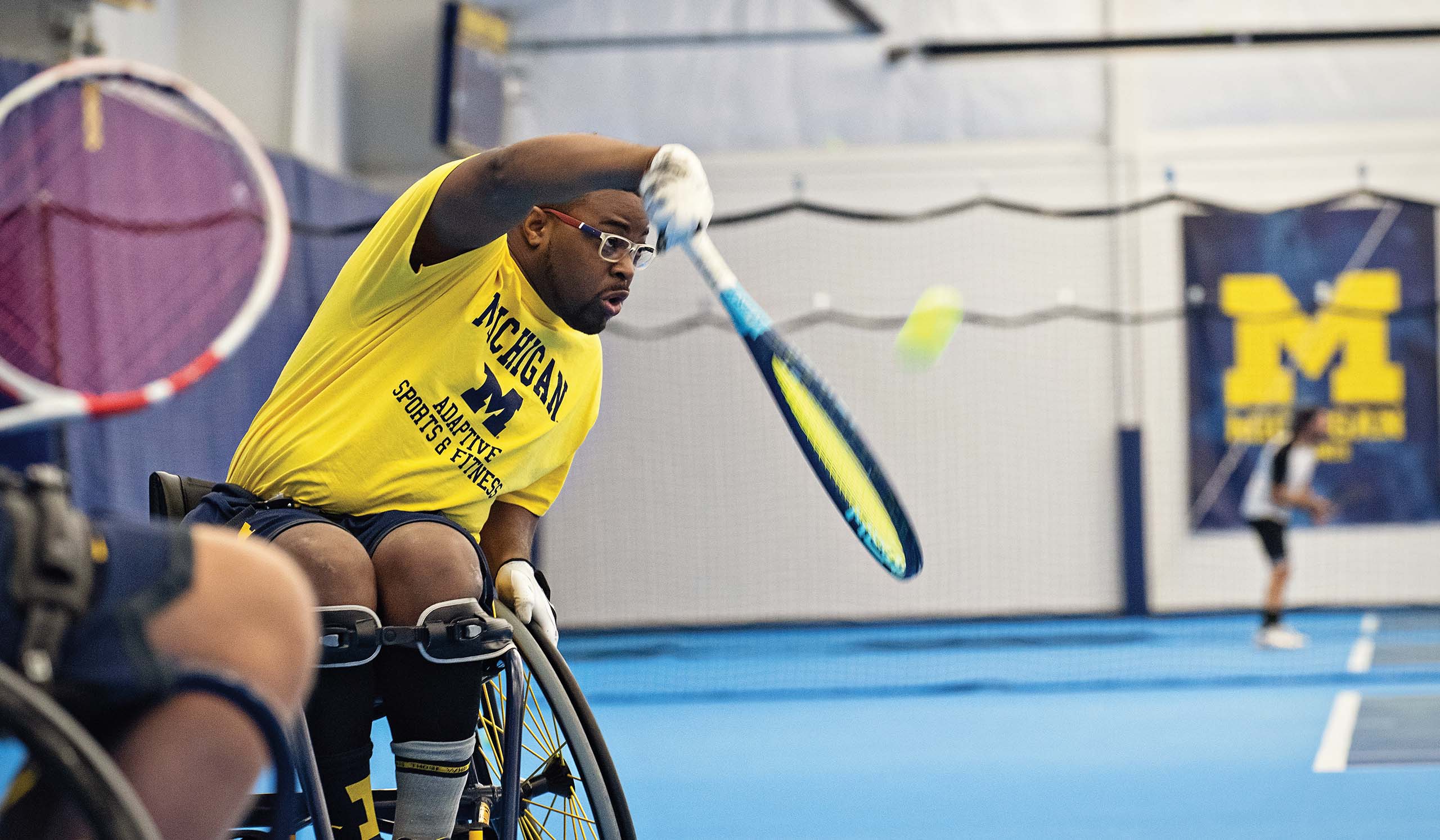
Grewe, a first-year student in the Medical School, beat India’s Mariyappan Thangavelu in the men’s T63 high jump, finishing on top at 1.88 meters to win his first Paralympic gold medal.
“Winning the gold medal in Tokyo was so incredibly special to me,” Grewe says. “When I cleared the final bar to claim the gold medal, it all kind of washed over me that I had achieved my dreams.” His win required hundreds of hours on the track and in the weight room, late nights spent studying the sport, and finding time in his busy academic schedule to train.
Grewe says his decision to study medicine at Michigan was influenced by the opportunity to continue his training with the ASAF team, which offers the facilities and resources he needs to sustain his Paralympic winning streak, by Ann Arbor’s proximity to his family, and by his work with “Dr. O.”
“Dr. O has played a huge role in getting me to where I am in life,” Grewe says. “He’s been a mentor in my academic life, athletic life, and personal life. Now that I am a medical student at U-M, I’m excited to be joining the ASAF team. It’s important to me to be surrounded by like-minded people who are driven and committed to advancing the Paralympic movement.”
With COVID-19 concerns still looming, Okanlami sits on U-M President Mark Schlissel’s COVID-19 Campus Health Response Committee, which has supported health efforts during the pandemic.
“As a family medicine physician with a disability who runs the disability services for the University, having a seat at the table puts a central focus on the disability community in the decisions we make,” Okanlami says. “I view our COVID response through a clinical lens while ensuring that minoritized groups are not forgotten.”
Claudia Capos, ’73, is an award-winning journalist, writer, and editor. Her feature articles on research, business, celebrities, and travel have appeared in national and international publications.


